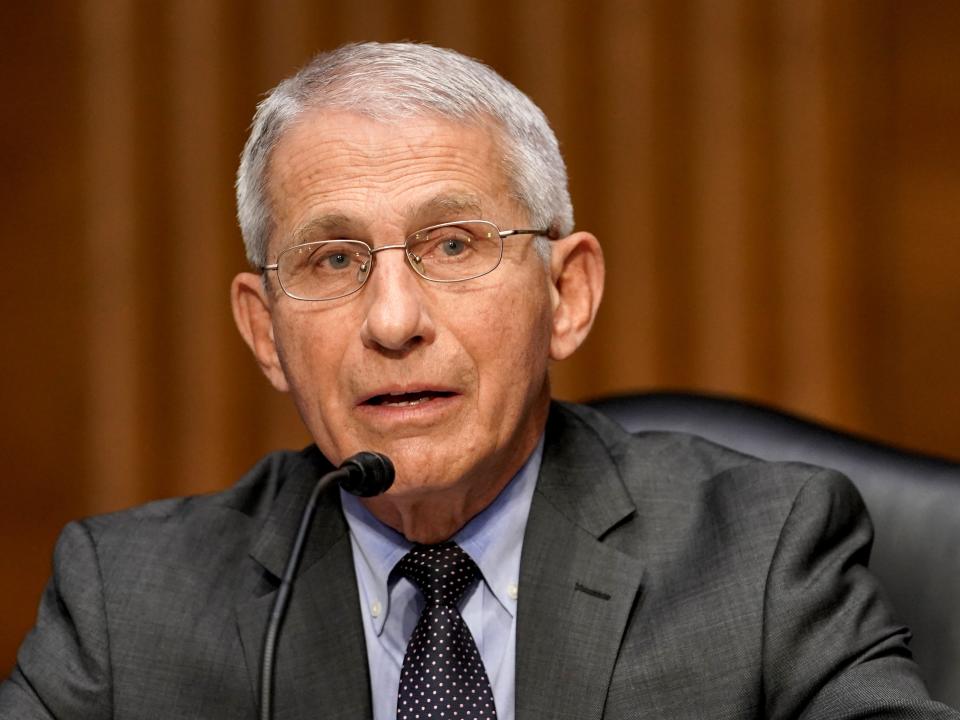Fauci says people will not be forced to get Covid shot by White House

Dr Anthony Fauci, director of the National Institute of Allergy and Infectious Diseases, answers questions during a Senate Health, Education, Labor and Pensions Committee
(EPA)The nation’s top infectious disease expert, doctor Anthony Fauci, has recognised an individual’s right not to be “forced” into receiving a vaccination while discussing the concept of a federal coronavirus passport, saying such a scheme would be “discriminatory”.
In an appearance on CNN with Chris Cuomo on Wednesday the director of the US National Institute of Allergy and Infectious Diseases was quizzed as to why the US government is not federally mandating coronavirus passports across the US.
"It’s a complex reason,” Dr Fauci said, before adding that in requiring a passport “you’re going to be discriminating against people and putting people at a disadvantage of essentially forcing them in many respects to get vaccinated.”
Continuing to push the doctor on the issue, Cuomo continued: “It’s one thing if you don’t give me the chance to get the vaccine… but if you make sure the vaccination is available, then everybody gets to make a choice.”
Dr Fauci responded: "What the administration is saying is that they’re not going to mandate a passport for vaccines centrally," before adding that businesses and educational institutions could likely enforce their own private systems.
“I don’t have the answer for you… I understand and you could make a good argument for that, Chris, I’m not arguing with you but the policy is they don’t want to do it centrally,” Dr Fauci said when pushed on the issue a third time.
He added: “They don’t want to have a central dictate that you have to have a passport because they don’t want to put people in compromised positions.”
The doctor previously confirmed in April that the United States federal government had no intention of requiring standardised vaccine identification throughout the US.
The resurfaced discussion comes as the Centres for Disease Control and Prevention (CDC) last week announced that fully vaccinated Americans would not have to wear masks or social distance in any setting.
Critics such as Cuomo have argued that no one will not be able to “differentiate the vaccinated from the unvaccinated” and that the new guidance will essentially allow those who don’t want to follow the CDC’s guidelines to break them undetected.
White House press secretary Jen Psaki has said previously that the Biden administration would not enforce a "federal mandate requiring everyone to obtain a single vaccination credential” as proof of vaccination.
Vaccine passports would provide some kind of certification that an individual had received a coronavirus vaccination, and would therefore be less likely to spread the novel coronavirus in close quarters.
The concept has quickly become politicised, with a number of states such as Arizona, Florida and Texas having issued executive orders in an attempt to prevent their use, with the sunshine state’s ban stating that the concept would create “two classes of citizens based on vaccination.”
New York state and Hawaii, on the other hand, have become the first two states in the country to introduce vaccine verification programmes. New York’s digital “Excelsior Pass” was launched in March.
A poll by Morning Consult last month revealed that more than three in five Americans supported some kind of vaccine certification but only 40 per cent were in favour of allowing businesses to demand proof upon entry.
Read More
Big gaps in vaccine rates across the US worry health experts
Covid vaccine booster shot will likely be needed ‘within a year’ of first dose, says Fauci

 money
money 